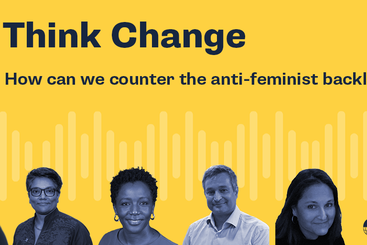Just over a year since the US Supreme Court overturned Roe v. Wade, the Women Deliver Conference in Kigali this week has never felt more timely or more necessary. The Conference themes are urgent in the face of a growing, sustained and coordinated attack on the rights and freedoms of women and girls and the LGBTQI+ community – and, ultimately, of all of us who believe in an open, plural and inclusive society.
The gains made over decades are being driven back in several areas, from reproductive rights to gender-based violence, LGBTQI+ equality and women’s place in politics. Progress in sexist social norms has stalled over the last decade as the global consensus around gender justice fractures.
The proportion of women heads of state has remained stuck at around 10% worldwide since 1995. Almost 50% of people think men make better politicians than women, and a quarter still think it’s acceptable for a man to beat his wife for failing to deliver domestic work.
What is behind this lack of progress, and what’s driving these sustained attacks on individual freedoms?
For decades a loose coalition of actors has succeeded in stalling progress and undermining rights and freedoms. Anti-rights networks, actors and movements are well-organised and extremely well-funded compared to progressive rights movements. Between 2013 and 2017, LGBTQI+ movements received $1.2 billion while anti-gender movements globally received $3.7 billion. Between 2008 and 2018, 54 organisations engaged in anti-gender activism, based mainly in the United States, Russia and Europe, received more than $700 million. Only 1% of ODA goes to feminist social movements.
Beyond the funding, organisations and actors have trained and supported representatives to enter positions of power in governments, judiciaries and other areas of influence. Anti-rights entities from the United States, Iran, Saudi Arabia and the Vatican, among others, are coopting human rights language and diluting or deleting reference to sexual and reproductive rights, supported by conservative civil society organisations with access to UN decision-making negotiations and forums.
Anti-LGBTQI+ narratives are being actively promoted all over the world, most obviously in Uganda, where the Anti-Homosexuality Act passed into law in 2023. In Florida, House Bill 2023: 1069 prohibits teachers from covering gender diversity, sexuality and non-heteronormative sex in reproductive health education, among other things. Gender-diverse literature is banned in Texas classrooms.
Anti-feminist sentiment is increasingly part of public policy and domestic political narratives. Of the 1,572 US politicians who have helped ban abortion since Roe was overturned, 86% are men. Online attacks on women in politics are weakening the democratic process; in Kenya’s general election in 2022, 60% of women candidates were subject to insults or hate speech.
The intent of all of this is not just to undermine existing systems and institutions that protect women’s rights, but to actively construct others to reproduce inequality, solidifying and extending patriarchal power and control.
This is part of a wider erosion of democratic norms and rights marked by shrinking civic space, reductions in civil liberties, discriminatory and exclusionary policies and attempts to undermine the legitimacy of the electoral process.
Countering these anti-feminist, anti-democratic trends is everyone’s responsibility, in every walk of life, at work, in the home, in society. We need radical action across the board, with policy-makers, politicians, citizens and civil society, driven by the collective voices of women and men.
This is partly about funding and investment in women’s feminist and wider social justice movements. But it’s also about demanding more voice and equality across politics, economic rights and financial independence, and the elimination of men’s violence against women and LGBTQI+ communities.
It’s a big ask, of course, and always has been. This isn’t about starting but continuing to push for change: investing in gender-equitable education; addressing the violence and misogyny embedded in digital spaces; resisting ‘norm spoiling’ in international agreements; and (re)asserting the moral authority embedded in the work of generations of women and men fighting for gender justice and social equity.
As one of the largest gatherings of its kind in the world, Women Deliver 2023 provides an important rallying point in pushing back against the corrosive gender norms that sustain inequality. Challenging restrictive, discriminatory and oppressive norms is by no means the only answer to the wider challenges the backlash against feminism and democracy poses – but it is one powerful piece in a wider and more complex effort towards transformative change.
To understand more, click the image below to read our newest Framing paper from ALIGN by the Gender Equality & Social Inclusion team:




